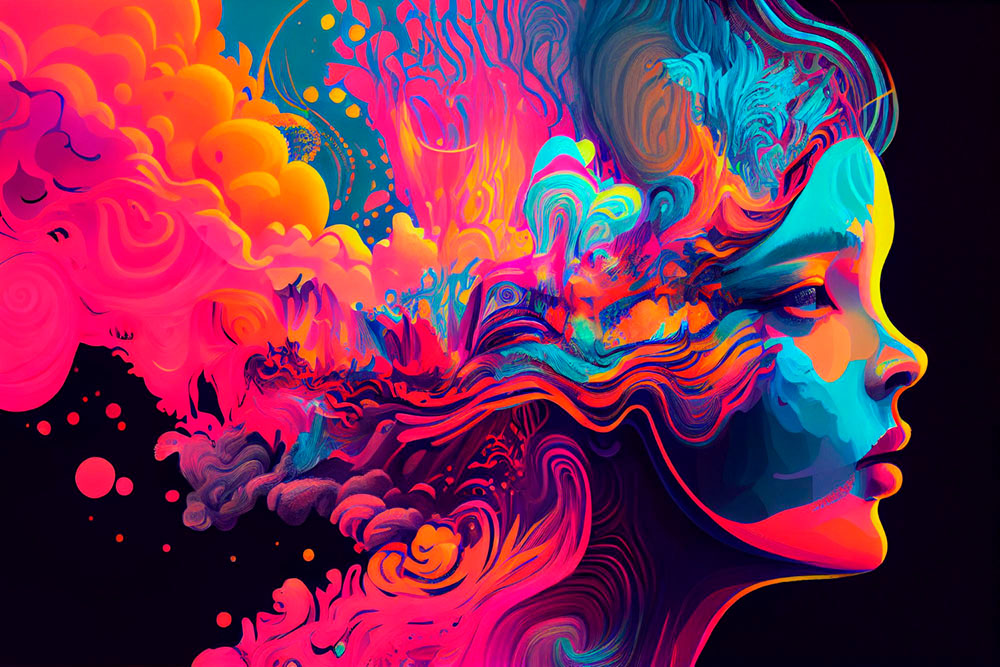
The Psychedelic Renaissance and its Impact on Mental Health

Mental Health | October 23, 2023 | BY Sozo Centers
In recent years, a remarkable resurgence has been witnessed in the realm of psychedelic substances, marking what can only be described as a “Psychedelic Renaissance.” This revival represents a paradigm shift in our understanding of these powerful compounds and their potential to revolutionize the field of mental health. At the heart of this renaissance lies the tantalizing prospect of addressing a long-standing treatment gap in psychiatric disorders, offering a glimmer of hope to countless individuals who have struggled with mental health challenges for far too long.
To delve deeper into this fascinating topic, we will draw insights from several reputable sources that shed light on the intersection of psychedelics and mental health. Our journey will take us through articles from Scientific American, Psychiatric Times, and Everyday Health, each providing valuable perspectives on this burgeoning field. In the pages that follow, we will explore the historical context, scientific breakthroughs, real-world success stories, and the potential challenges associated with the Psychedelic Renaissance, all with the ultimate goal of gaining a comprehensive understanding of the impact of psychedelics on mental health.
The Revival of Psychedelics
To comprehend the significance of the Psychedelic Renaissance, it’s essential to first take a step back and examine the historical journey of psychedelics. Psychedelic substances, including but not limited to LSD, psilocybin (the active compound in magic mushrooms), and MDMA, have a storied history that dates back centuries. Many indigenous cultures incorporated these substances into their spiritual and healing practices, recognizing their profound capacity to alter consciousness and potentially heal the mind.
However, as the 20th century unfolded, psychedelics became entangled in a web of stigma and fear. The countercultural movements of the 1960s brought these substances to the forefront, sparking both fascination and apprehension. Governments around the world responded with strict regulations, classifying psychedelics as illegal substances with no recognized medical value.
In the past decade or so, there has been a notable shift in how society perceives psychedelics. What was once considered the domain of rebels and outlaws is now the subject of serious scientific inquiry and mainstream discussion. This transformation in public perception can be attributed to several factors.
The Scientific American article titled “A Renaissance for Psychedelics Could Fill a Long-Standing Treatment Gap for Psychiatric Disorders” Scientific American Article provides valuable insights into the resurgence of interest in psychedelics and their potential role in addressing psychiatric disorders. This source explores the scientific studies and clinical trials that have reignited interest in these substances, highlighting their potential to fill a critical treatment gap in mental health care. As we continue our exploration of the Psychedelic Renaissance, we will draw upon the findings and perspectives presented in this informative article.
Psychedelics and Psychiatry
The potential of psychedelics in the field of psychiatry is nothing short of revolutionary. These substances, long relegated to the fringes of medicine, are now being reconsidered for their therapeutic properties. At the heart of their promise lies their ability to induce profound alterations in consciousness, which, when guided by trained professionals in controlled settings, can lead to powerful therapeutic outcomes.
Psychedelics like psilocybin, LSD, and MDMA have shown remarkable potential in the treatment of various mental health disorders. Psilocybin, for instance, has demonstrated efficacy in reducing symptoms of depression and anxiety, even in individuals who have not responded to conventional treatments. This suggests that psychedelics may offer new avenues for those with treatment-resistant conditions.
The Psychiatric Times article titled “Psychedelics and the Future of Psychiatry” Psychiatric Times Article delves into the scientific research that underpins the resurgence of psychedelics in psychiatry. This source provides a comprehensive overview of the studies and clinical trials that have garnered significant attention in recent years.
The Mechanisms of Psychedelic Therapy
The mechanisms through which psychedelic substances influence mental health are complex and multifaceted. These substances primarily affect the brain’s serotonin system, which plays a crucial role in regulating mood, emotions, and cognition. Psychedelics like psilocybin and LSD are serotonin receptor agonists, meaning they bind to and activate serotonin receptors, particularly the 5-HT2A receptor.
When a person consumes a psychedelic substance, it leads to a temporary disruption of the brain’s default mode network (DMN). The DMN is associated with self-referential thinking and the ego, and its hyperactivity has been linked to conditions like depression and anxiety. Psychedelics reduce the activity of the DMN, allowing for a more fluid and interconnected flow of thoughts and experiences. This can lead to a profound altered state of consciousness, characterized by increased introspection, emotional release, and a sense of interconnectedness with the world.
Psilocybin, found in magic mushrooms, and MDMA, commonly known as ecstasy, have garnered significant attention for their therapeutic potential.
Psilocybin has shown remarkable promise in the treatment of depression, anxiety, and PTSD. It can induce deeply introspective and emotionally intense experiences, which, when guided by trained therapists, can help individuals confront and process traumatic memories, negative thought patterns, and existential concerns. The lasting changes in perspective and mood observed in clinical trials suggest that psilocybin may offer a unique avenue for mental health healing.
MDMA, on the other hand, is known for its empathogenic and prosocial effects. In the context of therapy, MDMA can promote trust and emotional openness between the therapist and patient. This has been particularly useful in treating PTSD, where individuals often struggle to engage with their traumatic memories. MDMA-assisted therapy can help patients approach these painful memories with reduced fear and defensiveness, making it easier to process and integrate them.
One of the critical aspects of psychedelic therapy is the need for guided and supervised sessions. Unlike recreational use, where individuals may take these substances without proper guidance, therapeutic sessions are carefully structured and supervised by trained professionals.
The role of therapists or facilitators is to create a safe and supportive environment for the individual undergoing the psychedelic experience. They help the participant navigate the intense and often emotionally charged journey that psychedelics can induce. Therapists offer guidance, reassurance, and a compassionate presence, allowing the individual to explore their inner world with a sense of security.
Additionally, therapists play a crucial role in the integration process, helping patients make sense of their psychedelic experiences and apply insights gained during the sessions to their daily lives. This integration phase is essential for lasting therapeutic benefits.
Real-Life Success Stories
The real-life success stories emerging from the realm of psychedelic therapy are nothing short of awe-inspiring, offering glimpses into the transformative potential of these substances for mental health. While it’s important to note that anecdotal accounts are not a substitute for rigorous scientific research, they provide powerful testimonies to the therapeutic promise of psychedelics.
Case Study 1: John’s Journey to Overcoming Depression
John, a 45-year-old software engineer, had battled severe depression for over a decade. Conventional treatments, including various medications and talk therapy, had yielded limited results. Feeling desperate, he decided to participate in a clinical trial of psilocybin-assisted therapy. Under the guidance of trained therapists, John underwent a profound psychedelic experience that allowed him to confront the root causes of his depression. He emerged from the session with a newfound sense of purpose and hope. Over the following months, he continued therapy and experienced a sustained improvement in his mood. John’s story illustrates the potential of psychedelics to break through treatment-resistant depression.
Case Study 2: Emma’s Healing Journey with MDMA for PTSD
Emma, a military veteran, had struggled with debilitating PTSD for years. Her life was marked by flashbacks, nightmares, and social withdrawal. Traditional therapy and medications provided little relief. However, in an MDMA-assisted therapy session, Emma was able to confront her traumatic memories with a sense of safety and openness she had never experienced before. The MDMA allowed her to explore her trauma with reduced fear, enabling her to process and integrate the painful memories. After several sessions, Emma reported a significant reduction in PTSD symptoms and an improved quality of life.
These real-life success stories underscore the transformative potential of psychedelic therapy. In the controlled and supportive environment provided by trained therapists, individuals can access profound states of consciousness that enable them to confront and process deeply ingrained emotional and psychological issues. These experiences often lead to breakthroughs and shifts in perspective that can be life-changing.
The Future of Psychedelics in Mental Health
The future of psychedelic therapies in mental health appears promising. As research continues to accumulate and demonstrate their effectiveness, there is a growing acceptance of these therapies within medical and psychiatric communities. The shift from stigmatization to mainstream acceptance is indicative of the potential for these treatments to become a standard part of mental health care.
Ongoing research and clinical trials are essential components of the Psychedelic Renaissance. Numerous studies are investigating the use of psychedelics like psilocybin and MDMA in various mental health conditions. These trials aim to provide a more comprehensive understanding of dosing, safety, and long-term outcomes. Promising results from these studies can pave the way for broader adoption of psychedelic therapies.
Legislative changes are occurring in various regions, reflecting the evolving perspective on psychedelics. Some areas have decriminalized or legalized certain psychedelic substances for therapeutic or recreational use. These changes signal a shifting paradigm in drug policy and may pave the way for more research and therapeutic applications.
In conclusion, the Psychedelic Renaissance is not a passing trend but a profound shift in our approach to mental health treatment. It represents a bridge between science and spirituality, offering the potential for deep healing and personal growth. As we move forward, it is essential for individuals, healthcare professionals, and policymakers to stay informed about the latest developments in this field. By doing so, we can collectively explore the transformative potential of psychedelics and pave the way for a more compassionate and effective approach to mental health care.
By combining Spravato treatment with the latest advancements in mental health care, Sozo wellness Centers aims to provide a holistic approach that empowers our clients to find their path to recovery and a brighter future. With a commitment to compassionate care and ongoing research, Sozo is dedicated to transforming lives and contributing to the evolving landscape of mental health treatment.

